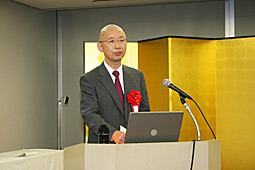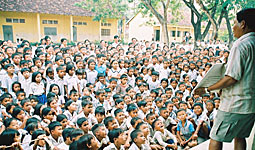 The Winner of the 7th Iue Asia Pacific Culture Prize : the Shanti Volunteer Association (SVA)
The Winner of the 7th Iue Asia Pacific Culture Prize : the Shanti Volunteer Association (SVA)


Outline of the Shanti Volunteer Association (SVA)
The Japan Sotoshu Relief Committee (JSRC), the forerunner of SVA, was formed in response to the huge outflow of refugees from Indochina in 1979. Centering on volunteers who participated in these activities, in 1981 the organization was reorganized as the Sotoshu Volunteer Association. In 1999, the Association was recognized by the Japanese government as a legally constituted organization, after which its name was changed to the Shanti Volunteer Association (SVA). In Sanskrit, the word Shanti means ‘peace and tranquility.
’SVA focused on educational and cultural support in refugee camps, including libraries, printing and publications. However, due to closure of the camps, SVA’s activities were redirected to reconstruction and development cooperation in Thailand, Laos, and Cambodia. The areas SVA now covers have grown to include Afghanistan and Burmese refugee camps within Thailand. Fields of activity are also expanding, and now include school construction, production/distribution of teaching materials and teacher training. In all of these countries, library services (including mobile services) and supporting the revival/development of traditional culture are positioned as key activities.
Since 1995, having learned from the relief activities for victims of the Hanshin/Awaji Earthquake, SVA has been engaged in emergency relief efforts all over the world.
Reason for Selecting SVA for the 7th Iue Asia Pacific Culture Prize
 Winner: Shanti Volunteer Association (SVA)
Winner: Shanti Volunteer Association (SVA)
The Shanti Volunteer Association (SVA) was officially approved as a nonprofit organization by Japan’s Ministry of Foreign Affairs in August 1999. SVA began as the Sotoshu Volunteer Association that was launched by volunteers of the Japan Sotoshu Relief Committee (JSRC). JSRC was formed by the Soto Sect of Zen Buddhism in January 1980 to assist Cambodian refugees who had fled to Thailand.
Since its inception, SVA has continued efforts to bring libraries and publishing activities to Cambodian refugee camps in Thailand, and provided support to children who had been robbed of the opportunity to learn and subsequently future choices because of economic poverty, the lack of schools, etc. Now, SVA has expanded the scope of those activities from the educational and cultural aid operations in Cambodian refugee camps to provide aid to the socially weak in Thailand and educational support in Laos, Cambodia and Afghanistan, with the aim of building a world where everyone can live and learn together. Efforts are also being undertaken to provide educational and cultural aid and assist the socially weak, through the Sikkha Asia Foundation that they established in Thailand.
Through these activities, SVA continues to promote exchange and build networks on the grassroots level, and produce many results by providing opportunities to learn from one another in various countries. The Asia Pacific Culture Prize was awarded to SVA for their steadfast contributions to peace (shanty) in the Asia region and the achievements they have made, with the strong hope that they will continue to make even more contributions in the future.






